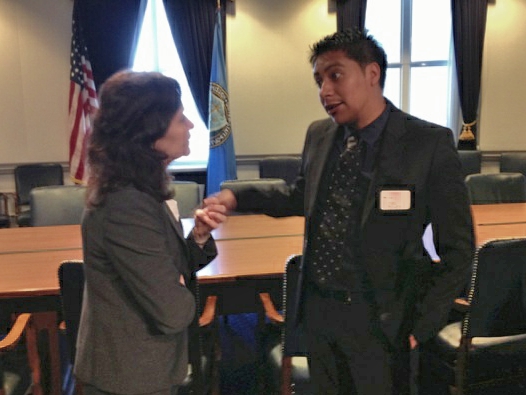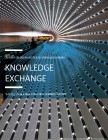“When is the last time you have three days to think?” said Malkia. My brain was lit with ideas on the last day of the 6th annual Knowledge Exchange – hosted by the Consumers Union and Center for Media Justice in Washington DC. I surveyed the room – every wall littered with pages of ideas, questions, and challenges. I had made strong connections with the two-dozen people around the table. I had stood shoulder to shoulder with the first female, African-American chairperson of the FCC. And I had gotten clarity on what our media policy focus should be for the rest of the Obama administration. I was going home with a concrete plan.
When I was first invited to attend the Knowledge Exchange my response was less than gracious. “Why me?” That is: Does it really make sense to haul me and my two-year-old to DC to talk about things like the IP phone transition?
I came to media work as a community organizer who saw our work on LGBT, housing, and anti-war issues stymied by media consolidation in the 90s. I believe in the value of media justice as a necessary step towards a more equitable distribution of power and resources. Still, after 15 years of this work, I find it challenging to mobilize my community here in Champaign-Urbana, Illinois around media policy, which is overshadowed by other, more tangible, more local issues. We are organizing against demolition and forced relocation of an entire neighborhood, a $22 million expansion of our county jail, and a string of police brutality cases. Yes, these problems are maintained and exacerbated by the media landscape. But “media justice issues are secondary issues” as Malkia explained at the Knowledge Exchange. “They need to be attached to primary issues.”
So that’s what we set out to do. During the Exchange a representative from Movement Strategies for Change drew circles on the board: one for what we want, one for what is politically feasible, and one for false solutions. “Lead with vision” she said. “Move from a defensive stance into a forward stance – your politically feasible solutions should be on the path to your ultimately desirable ones.”
We grappled with this concept for half a day. We came up with a short list of what we can work on together for the next two years. It includes getting the FCC to intervene on the high cost of phone calls from prison. It includes preserving and expanding Lifeline – a service to ensure everyone has access to a phone. It includes winning privacy protections so warrants are needed to track your location on your phone or to read your email or documents in the cloud. Yes, that’s right, no warrant is needed now Chris Calabrese from the American Civil Liberties Union confirmed.
 Our policy agenda was made up of winnable solutions that will move us toward our vision and have an impact on peoples’ lived experiences. It was a solid list, but did we have champions to help carry this agenda forward? The next day we walked across the National Mall to find out. The first stop was a hefty hour-long meeting with Chairwoman Ramirez of the Federal Trade Commission. We walked into the majestic oval office and were met by a relaxed, confident Latina woman who is known for challenging industry violations of consumer rights – she imposed a $22.5 million fine on Google for repeated violations of our privacy. We spoke to her about the need for greater privacy protections, especially for kids of color who are tracked, profiled and targeted with more junk food ads than white children, exacerbating health disparities.
Our policy agenda was made up of winnable solutions that will move us toward our vision and have an impact on peoples’ lived experiences. It was a solid list, but did we have champions to help carry this agenda forward? The next day we walked across the National Mall to find out. The first stop was a hefty hour-long meeting with Chairwoman Ramirez of the Federal Trade Commission. We walked into the majestic oval office and were met by a relaxed, confident Latina woman who is known for challenging industry violations of consumer rights – she imposed a $22.5 million fine on Google for repeated violations of our privacy. We spoke to her about the need for greater privacy protections, especially for kids of color who are tracked, profiled and targeted with more junk food ads than white children, exacerbating health disparities.
Then we went to the Federal Communications Commission to meet with Commissioner Rosenworcel. This meeting gave me chance to thank her for her support passing the Local Community Radio Act – when she worked for Senator Rockefeller. I shared with Ms. Rosenworcel the story of Champaign resident Don Merriweather, a 65-year-old veteran who uses Lifeline to access health care and find a place to sleep at night. I also urged her to expand this program to guarantee basic internet service in every home – so people can apply for jobs, do homework, and organize to meet their needs.
Our last stop was with the interim FCC Chairwoman Clyburn, an immensely warm woman who gave us her full attention and a dose of southern humor. We spoke of the silent suffering of families of inmates who have to choose between connecting with their loved ones behind bars and paying the bills. We hope and expect to see movement on this issue under her leadership.
I remember a time 15 years ago when these relationships did not exist. When we were truly on the outside looking in. But now “it is clear they are listening to us,” said Chris Mitchell, a Knowledge Exchange participant from the Institute for Local Self Reliance. “They are reading our materials, and recognizing we have power.”
 It became clear in the final days how I could help our movement better assert this power. The Knowledge Exchange helped me bridge the gap between local and national efforts – sparking a design for how to directly benefit to my community while strategically tying into opportune moments to make an impact in Washington. I pledged to hold a monthly media justice event at the Urbana-Champaign Independent Media Center. Each event will have direct service, education, input, and action components. For example, in August, we will hold an event to help residents without phone service sign up for Lifeline. We will invite subject experts to present via video conference on the threats to Lifeline and opportunities to expand it. And we will educate and empower our members – many of whom qualify for Lifeline- to have input in policymaking in process.
It became clear in the final days how I could help our movement better assert this power. The Knowledge Exchange helped me bridge the gap between local and national efforts – sparking a design for how to directly benefit to my community while strategically tying into opportune moments to make an impact in Washington. I pledged to hold a monthly media justice event at the Urbana-Champaign Independent Media Center. Each event will have direct service, education, input, and action components. For example, in August, we will hold an event to help residents without phone service sign up for Lifeline. We will invite subject experts to present via video conference on the threats to Lifeline and opportunities to expand it. And we will educate and empower our members – many of whom qualify for Lifeline- to have input in policymaking in process.
The Knowledge Exchange offered us delicious, action-packed days where we got a chance to work closely and think together. I was grateful for the opportunity to strategize with the inspiration of thoughtful, committed colleagues who are working on media policy to further social justice.
Danielle Chynoweth is currently a senior project manager at Pixo. She co-founded the Urbana-Champaign Independent Media Center (Media Action Grassroots Network Anchor) and led its purchase and the conversion of the downtown post-office building into a community media and arts center. She now serves as a board member.
 DOWNLOAD, READ AND SHARE THE 2013 KNOWLEDGE EXCHANGE REPORT: A TELECOM AGENDA FOR A NEW ADMINISTRATION
DOWNLOAD, READ AND SHARE THE 2013 KNOWLEDGE EXCHANGE REPORT: A TELECOM AGENDA FOR A NEW ADMINISTRATION



